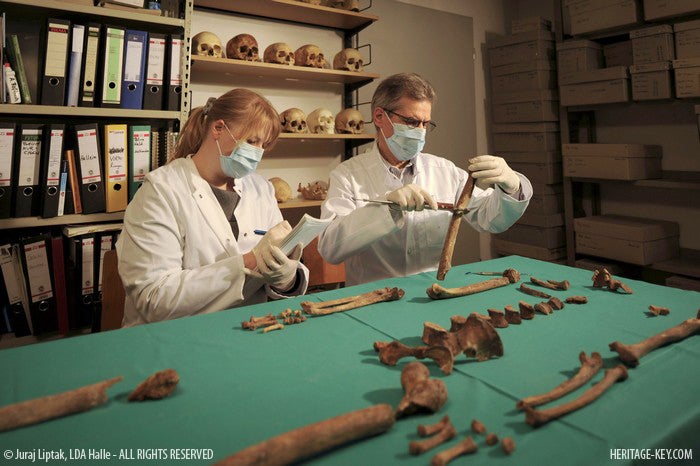Alfred the Great's granddaughter comes home

A lead box hidden inside a dusty tomb in Germany is the home of Alfred the Great's granddaughter, Queen Eadgyth. The tomb, opened in 2008 by archaeologists at Magdeburg Cathedral, carries the inscription “EDIT REGINE CINERES HIC SARCOPHAGVS HABET...” (the remains of Queen Eadgyth are in this sarcophagus...), and scientific tests on the bones inside have confirmed their owner's ancient identity.
Project Director Prof Harald Meller, of the State Office for Heritage Management and Archaeology, Saxony-Anhalt, explains why the identification process has been so fraught: “Medieval bones were moved frequently, and often mixed up, so it required some exceptional science to prove that they are indeed those of Eadgyth.”
University of Bristol expert Dr Alistair Pike explains the cutting-edge technology behind his team's identification of the long-lost queen, who moved to Germany to marry King Otto of Saxony in 929: “Strontium isotopes on tiny samples of tooth enamel have been measured. By micro sampling, using a laser, we can reconstruct the sequence of a person’s whereabouts, month by month up to the age of 14.” The records remarkably matched historical records of Eadgyth's childhood growing up in Wessex.
“Eadgyth must have moved around the kingdom following her father, king Edward the Elder during his reign,” adds Bristol's Prof Mark Horton. “When her mother was divorced in 919 - Eadgyth was between nine and ten - both were banished to a monastery, maybe Winchester or Wilton in Salisbury.”
Amazingly young Eadgyth's traumatic move has been identified on her skeleton too. Following her short holiday back in Britain, Eadgyth's bones will be reburied in Magdeburg Cathedral later this year, exactly 500 years after their last interment in 1510.
Saxon Queen Eadgyth's remains discovered in Germany
Join our commenting forum
Join thought-provoking conversations, follow other Independent readers and see their replies
Comments
Bookmark popover
Removed from bookmarks